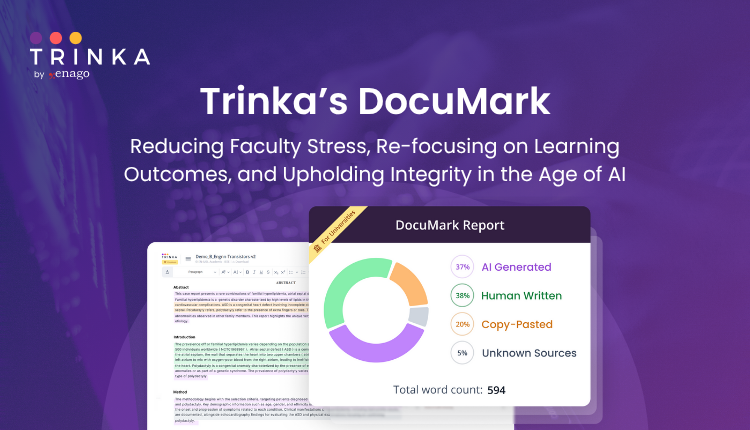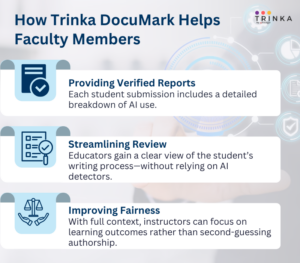Trinka’s DocuMark: Reducing Faculty Stress, Re-focusing on Learning Outcomes, and Upholding Integrity in the Age of AI

The integration of artificial intelligence (AI) into academic life has completely transformed how students write. From drafting assignments with tools like ChatGPT and Copilot to receiving feedback from automated editors, AI is now deeply embedded in the learning ecosystem. While these tools boost productivity, they also raise urgent questions around academic integrity, transparency, and teacher workload.
Trinka’s DocuMark addresses these concerns head-on by shifting the focus from AI detection to learning, reflection, and student ownership. It enables educators to guide responsible AI use while reducing the burden of verification.
The Growing Need for Transparency in AI-Assisted Writing
A recent study of 1,000 U.S. college students found that 56% admitted to using AI tools to help complete assignments or exams. Interestingly, while over half (54%) believed this use constitutes cheating or plagiarism, a significant portion (25%) were undecided, and 21% felt it did not violate academic integrity.
These mixed perceptions highlight the growing ambiguity and stress both faculty and students face around ethical AI use. These concerns are compounded by a lack of visibility into how students use these tools. While some students use AI responsibly for brainstorming or grammar corrections, others rely on it to generate entire assignments.
Without a transparent framework, instructors struggle to assess genuine student effort versus misuse.
Introducing DocuMark – A Transparency Tool Redefining How Educators Approach AI-assisted Submissions
Unlike traditional AI detection tools, DocuMark is a transparency and verification tool designed to foster ethical AI use in academic writing. It provides a structured process where students are guided—not penalized—to disclose, review, and reflect on their use of AI during the writing process.
Here’s how it supports students:
- Ownership: Encourages students to take full responsibility for their work by actively engaging in the writing process and reviewing AI generated content before submission.
- Verification: Allows students to verify and, if necessary, edit their work to ensure it aligns with academic standards and integrity policies.
- Fair Grading: By providing a transparent view of the writing process, DocuMark facilitates fair grading practices, ensuring that assessments are based on genuine student effort.
By encouraging intentional reflection and transparent reporting, DocuMark fosters a culture of trust and responsible learning.
Reducing Faculty Stress and Workload
Faculty worldwide are experiencing increased stress as they navigate the complexities of AI use in student work. With the rise in AI-generated submissions, educators are now spending more time reviewing and verifying student authorship—often without clear institutional guidance or dedicated tools to support this process.
With DocuMark, faculty no longer need to rely on speculative AI detectors or engaging in time-consuming authorship investigations, they receive a transparent, student-verified account of the writing process. This includes clear disclosures of how and where AI tools were used, enabling them to make fair, informed evaluations grounded in student input and accountability.

In this way, DocuMark rebuilds trust and refocuses teaching priorities, allowing educators to move away from surveillance and return to their primary role as mentors.
Supporting Academic Integrity—Without Fear
As generative AI tools become increasingly embedded in academic work, universities are grappling with how to adapt their integrity frameworks. Research shows significant inconsistency across institutions in how AI usage is addressed: while some universities implement comprehensive, institution-wide AI policies, others leave it to individual instructors—or fail to address it altogether.
This patchwork approach leaves many faculty and students uncertain about what is considered acceptable. Notably, they have expressed strong support for clear, universal guidance, with most favoring a standardized institutional policy.
DocuMark offers a more balanced, actionable solution by:
- Aligning with Institutional Guidelines: Institutions can configure the tool to reflect their unique academic policies and acceptable AI-use scenarios.
- Facilitating Conflict Resolution: In case of suspected misconduct, the student’s verified report provides objective documentation for fair, evidence-based judgement.
- Shifting the Narrative: Instead of penalizing student’s post-submission, DocuMark integrates ethical checkpoints during the writing process itself.
This proactive model emphasizes learning and development rather than punitive enforcement.
A Tool for the Future of Education
As generative AI becomes a standard feature in widely used academic tools, institutions face the challenge of adapting their integrity systems to this evolving landscape. To remain effective, these systems must go beyond reactive detection and offer scalable, forward-thinking solutions.
DocuMark is more than an AI transparency tool—it is a pedagogical framework grounded in ethical learning design. It guides both educators and students to navigate AI use with responsibility, transparency, and academic purpose.
With its unique approach, DocuMark can:
- Act as a learning support system that fosters ethical awareness, not just a compliance checkpoint.
- Strengthen discipline-specific writing standards by encouraging consistent reflection across subject areas.
- Enhance accountability and visibility in hybrid and remote learning environments where process tracking is limited.
By incorporating AI transparency into the learning journey, institutions that implement DocuMark position themselves to uphold academic integrity while embracing technology in a future-ready way.
Conclusion
AI tools are here to stay. Rather than resist their presence, academic institutions must evolve their teaching practices. Trinka’s DocuMark enables this evolution by providing faculty and administrators a student-guided framework for responsible AI use.
By promoting transparency, reducing educator stress, and emphasizing learning outcomes, DocuMark bridges the gap between innovation and ethics. It guides students to own their work and empowers faculty to teach—confidently, clearly, and without constant doubt.
Ready to experience how DocuMark can support your institution? Book a demo to explore its features and see how it can transform AI use into a learning opportunity.
Watch the video below to see how this innovative tool redefines the teaching and learning experience in the age of AI.
